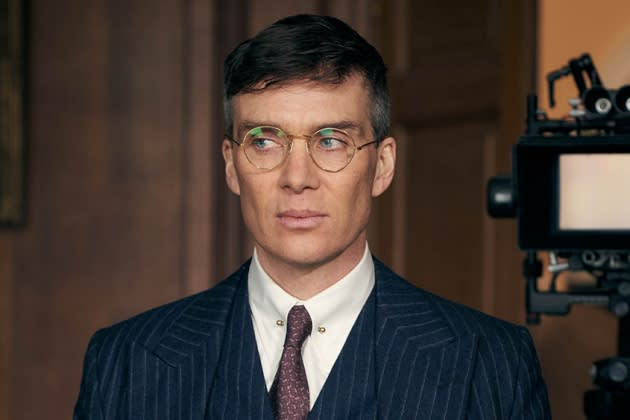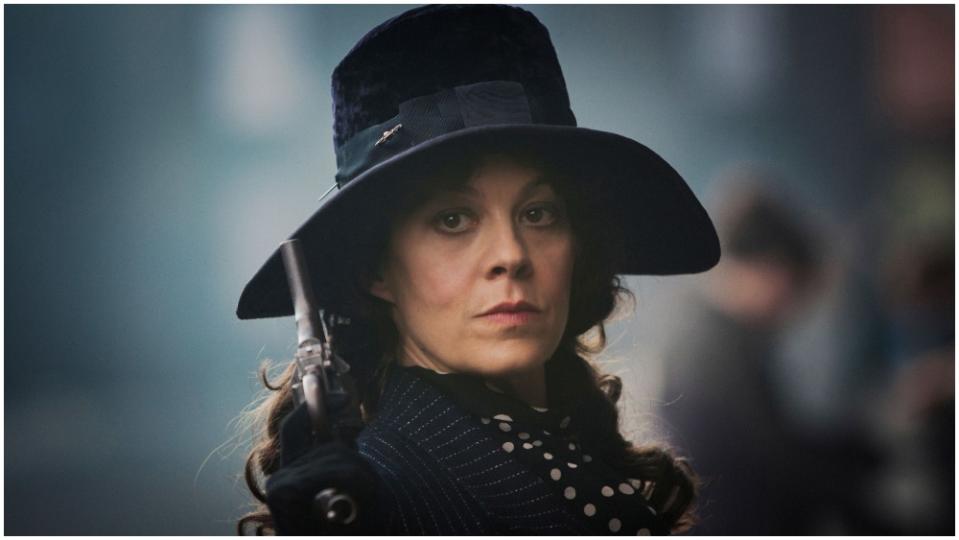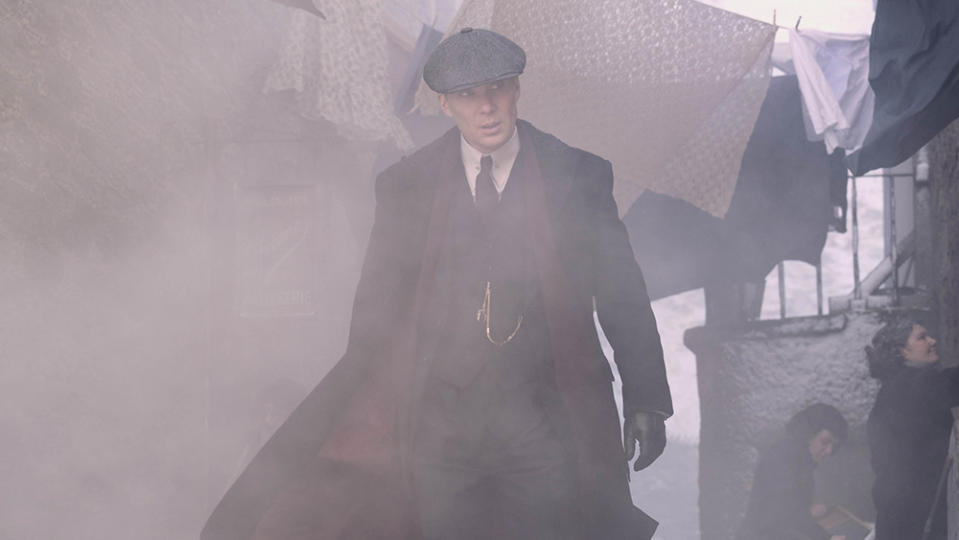Cillian Murphy: Final Season of ‘Peaky Blinders’ Is ‘Richest and Deepest’ to Date
- Oops!Something went wrong.Please try again later.
- Oops!Something went wrong.Please try again later.
- Oops!Something went wrong.Please try again later.

UPDATE: This piece has been modified on Feb. 27 with two additional questions that contain spoilers for Episode 1, Season 6 of “Peaky Blinders.”
Cillian Murphy was named one of the greatest Irish film actors in 2020 and has been nominated for multiple international awards over a 25-year career. But in stepping into an executive producing role in recent years, the “Peaky Blinders” star and frequent Christopher Nolan collaborator is discovering another side to the craft that’s been a humbling experience.
More from Variety
“I had to look at my own performances in a very cold and objective way,” Murphy tells Variety. “I think it’s a valuable lesson to look at the story in its entirety, without just, like, focusing on the size of your ears.”
When Murphy became a producer on Seasons 5 and 6 of “Peaky Blinders,” he had to take on new duties such as helping the edit team after long days of working as an actor and analyzing his portrayal of Tommy Shelby, the protagonist of the ruthless BBC period crime drama.
While juggling his final blaze of glory as Shelby in the acclaimed Steven Knight series, which concludes with the forthcoming Season 6, Murphy was also contending with making sure the final season lived up to the legacy of his late colleague and friend, Helen McCrory, who played his Aunt Polly on the show.
Murphy took time out to chat with Variety about the executive producer learning curve, running lines with his mom, the challenges of COVID-19 protocols, and preparing for Nolan’s “Oppenheimer.”
A lot has happened since Season 5 of “Peaky Blinders” back in 2019, and now the upcoming return of Season 6 this year. What do you think fans miss the most about the show, and what do you think they have the most to look forward to?
There’s always been a sort of long pause because, well, we do the show and then we all go off and do other jobs — we aren’t tied to the show the whole time. There’s always been a long-enough gap between each series since we initially started shooting this in, what, 2012? And now it is 2022, so when it comes to the math, that’s six seasons in 10 years. So, it’s been a long time! What can they expect? I think this is the culmination of the series that hopefully improves upon the last season and makes the most recent one the richest and deepest one that we possibly can, partially because of all of the pandemic shit happening in the world and, of course, the really sad loss of [Helen] McCrory. I think we are determined to make this a special series and we have been extra committed to working hard. I think the fans will be pleased!
I’m so sorry for your loss, Cillian. Your obit and tribute to Helen’s memory were recently published by “The Observer.” In it, you describe how much of a hole her death has left behind not only for you but for all on set. What was it like to film scenes in which you react to or discuss her character, Polly, knowing that Helen’s illness was progressing at the time? Does it feel fitting that the first episode is in memory and in honor of her?
I think the whole series is really in tribute to her and to honor her. Her presence and her character’s presence are very much still felt in the series, and it is very much part of Tommy’s journey in the season. It’ll be different without her, you know. It simply won’t be the same. I’ve spoken about how phenomenal she was as an actress and as a person and it is an enormous loss to the whole acting community and not just for our show. My thoughts are always with Damian [Lewis] and her kids. I just hope that the show will live up to her memory and our memory of her.

Everett Collection
Season 6 almost comes out at the 10-year anniversary of “Peaky Blinders.” How has your relationship with some of your cast members, crew and producers evolved in the past decade?
It’s been an adventure! Throughout “Peaky” there’s been a lot of different cast members, and we’ve had other directors, and I even executive produced Seasons 5 and 6. Because it is such an intense shoot due to the nature of the material, and because we are working about 16 hours a day for about five months, we don’t tend to hang out socially when we aren’t shooting. I think that’s only because we see so much of each other when we work, but it has been a very collaborative journey and I’ve learned a huge amount. When I became an exec producer, it was a real learning curve for me to be involved in post-production and see the series come together and have a seat at the table in that regard. So, that aspect has been an interesting evolution for me.
There’s a huge four-year time jump from the death of Polly to the reunion, so to speak, between Michael and Tommy in the first episode. Audiences really only hear the changes Tommy made in his life, but they don’t necessarily see his decision to sober up or his decision to go to Miquelon and leave his family behind. Why do you think he chose to go down that path?
Tommy chose to go down that path because, well, I think at the end of Season 5 he is wholly committed to killing himself. He has reached the end of the road in terms of being always one step ahead of people, and it was the first time that he was behind, and it increased his mental health issues and dependency and everything. That was his breaking point. When we see him four years later after losing Polly, he is trying to reform in some way and the tension in this series will be whether or not he can stay on that path. He is still struggling psychologically and mentally, even at the beginning of Season 6.
Tell me about the relationship between Tommy and Michael and how it has changed from the start of the show to the start of Season 6. In your opinion, what are the crucial points in the series that mark the erosion of their relationship and their trust in one another?
I think there is the classic drama set-up of the next generation wanting to take over from the older generation, and Tommy and Arthur feel that very explicitly. However, I don’t think it was until Season 5 that Michael wanted to take the company in a new direction. Tommy shuts him down, and that was the beginning of the erosion of trust, and then, obviously, Michael blames Tommy for the death of his mother, Polly. That is where it kind of starts to all fall apart for both of them.
There is a significant convergence of differing pivotal moments in history at the start of Season 6: There’s the end of prohibition, the rise of opium dealing and the opium trade in Europe and the United States, and the looming World War II. How much history did you research or become reacquainted with, both for the acting and the production side of things?
I’m already reading around to get the full scope of it all because there’s so much material around this time in history, so I just immerse myself in as much reading as I can. The thing about Steven’s [Knight’s] writing, though, is that he doesn’t land on the more obvious, major historical events. He always takes sort of an unusual, less-well-known event around that time and focuses the plot on it. So, for example, he had just researched that there was this weird kind of loophole that existed during prohibition in Miquelon and so he decided to put Tommy there, the first time we see him outside of Britain and in a completely different environment.
You had to speak a little bit of French for many of those scenes. Did you know French before filming, or did you have to learn these lines without knowing the language? And, does “Peaky” have a consultant on staff that teaches the correct pronunciation for words in French and Romani?
I sort of knew French from before because my mum is a French teacher. She’s retired now, but I sent her the lines and she spoke them back to me. I used to have very good French when I was young and had the energy to practise it but I let it go a bit and I don’t speak it anymore, so my mum refreshed me for those lines. Then, for the Romani, we do have a consultant who speaks Romani and translates all the lines for us, and breaks them down phonetically.
One of Polly’s last words in Season 5 is this premonition that goes something along the lines of, “There’ll be a war, but one of you will die. Which one I cannot tell.” The first episode of this season ends with Tommy teasing a start to a war between the Irish and the Jews and the Italians in Boston. How many wars will fans be privy to this season?
I don’t know if it will be out-and-out warfare, but there will be conflict and it will come from unexpected places. And much of the conflicts will be mostly psychological, that’s all I can say.

BBC/Caryn Mandabach Productions
What was it like to film the season amid the pandemic, and what were some of the COVID-19 protocols on set? Did they disrupt filming in any way, and what was that experience like?
We started shooting in January 2021, and that was the height of the second lockdown in Britain. There weren’t any vaccinations widely available yet, and everyone was in a high state of anxiety, and we had a very good COVID team and COVID supervisor. We were getting tested three times a week, and everybody was masked except, of course, the actors. We managed to get through the whole shoot without a case, which was quite a great result considering what was happening. I found it pretty hard to make a connection with the crew because everybody was masked, and you didn’t know who anybody really was in the crew, and I found that difficult because I’ve always been quite tight with the crew whenever I act. I thought it took away some of the spontaneity that I was used to doing when shooting on “Peaky.” However, I think that because we had all these obstacles, everybody really focused and committed and I think we all did some of our best work, despite the protocols. I am really just so proud of our crew and cast and what we manage to create under such difficult circumstances.
What lessons did you learn while executive producing “Peaky Blinders”?
There are two answers to that question. One is from a sort of personal perspective, which is that I’m never looking at the monitor when we are working. I try to just stay in the headspace of the character, and look at what they are looking at. I think I also learned a lot about storytelling in an editorial sense that I wasn’t aware of before, and it was a very collaborative experience to work with the other producers and with the director. It was nice to work with Steve, and actually have an input on the character, and then I also got to be involved in the music score, which was all very satisfying to me. I don’t think I’d want to do it on every job because it’s too much responsibility. But, this show was such a big chunk of my life, and I felt like there was a lot I could offer, so that was a really good experience.
I’m curious what it has been like to return to work with Christopher Nolan on “Oppenheimer” after doing multiple projects together. Now you’re his lead role, the main titular protagonist. What has it been like to return to work with him in that capacity?
Every time Chris has called me over the years, I always say yes, no matter what size the font my role is on the poster because I’m such a fan of his work and I love his movies so much. We’ve known each other since 2003 or something like that, so I feel like we’ve built up a lot of trust and respect over the years. I feel really honored to be asked to play this part for him and it’s great when you get to work with somebody that you’ve known for a long time because you develop a shorthand in the work. I can’t wait to get back into it and I think it’ll be quite special.
“Peaky Blinders” Series 6 is coming soon to BBC One and Player. This interview has been edited and condensed.
Best of Variety
Sign up for Variety’s Newsletter. For the latest news, follow us on Facebook, Twitter, and Instagram.

